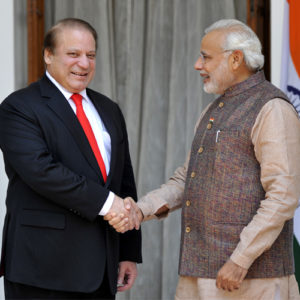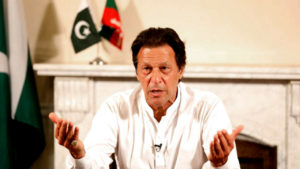Imran Khan’s bid for power – boon or bane for India?
Viewed from New Delhi, the possibility of Imran Khan heading the next government in Islamabad seems to be the worst of all possible outcomes of the election in Pakistan. However, if both sides are sincere, installation of an army-friendly government could mark the beginning of a new phase in search for peace in the subcontinent.
Indians have had a love-hate relationship with Imran Khan. As a bowler and captain of Pakistan cricket team, who often handed humiliating defeats to India, most Indian male cricket fans loathed him, while Indian women, from teenagers to middle-aged, were in love with the handsome and lanky man from across the border who was known to be quite a ladies man.
Though not in the same sense, India’s love-hate relationship will surely continue in Khan’s new profession – politics—and in his avatar as the Prime Minister of Pakistan. On the face of it, the mandarins of Indian government would not be too pleased with the outcome of the elections, even though it is pretty much on the expected lines. Despite his limitations and failure to deliver peace, India would have preferred to have former Prime Minister Nawaz Sharif back at the helm, mainly due to his perceived friendliness towards India and rather cordial relations with Indian Prime Minister Narendra Modi.
During the campaign, Imran Khan had berated Sharif’s ‘soft’ attitude towards India and also attacked India for playing the cop in the region. He repeatedly said that he would not accept India’s hegemony or “thanedaari”, like other South Asian nations have acceded to.
Departure of Sharif from the office was indeed a big setback for India and in the run up to the elections, India was indeed worried by the barely-veiled support that the Pakistan’s army – the real establishment and power centre in the country – had been giving to Imran Khan. India’s biggest worry is that if Khan did turn out to be the puppet prime minister as surely the Pakistani Army would like him to be, tensions between the two countries could spiral out of control.
Cross-border tensions
Indeed, over the last year or so, since Sharif’s exit from power, there has been a significant increase in cross-border tensions, with Pakistan and India indulging in almost-daily exchange of firing and shelling. The two sides have also abandoned even the semblance of an effort towards resolving the numerous issues including terrorism, water sharing and trade that divide them. There has barely been an official-level meeting and the relations are near rock bottom. So, short of a war, things could hardly get worse.
Imran Khan’s victory comes at this delicate stage. With the not-so-tacit backing of the Army, Imran Khan would definitely find himself in a much stronger position than his predecessor, who was tremendously disliked by the army, partly due to his attempts to build peace with India.
Thus when a strengthened Khan comes face to face with India’s Modi, who himself is one of the strongest prime ministers in nearly three decades, both would be careful to ensure that they are not seen to have blinked first. Khan has been strident in his attacks on Sharif for his India policy and would definitely not leave himself open to a counter-attack on the same account. Khan has also been rather soft on the terrorist organisations like Lashkar-e-Taiba, based in Pakistan and continuously targeting India, and that would be a big issue between the two countries.

Indian Prime Minister Narendra Modi with Nawaz Sharif, former Prime Minister of Pakistan, during his visit to Pakistan in 2015
Modi burnt his fingers by going on a sudden, unannounced visit to Pakistani city of Lahore in December 2015 on Sharif’s birthday, in an attempt to reopening talks between the two neighbours. However, it has now become a norm that whenever India and Pakistan seem to be moving towards a rapprochement, a sudden and vicious attack on India derails the relationship again. This story was also repeated within weeks of Modi’s gambit as heavily-armed terrorists attacked an Indian Air Force base, close to the border with Pakistan, killing seven soldiers in a four-day battle.
Since then Modi has gone back to his strongman tactics in his dealings with Pakistan and has refused to allow even junior official level dialogue from advancing. In his victory speech, Khan declared that for every step that India takes towards peace Pakistan will take two. Welcome as the declaration may be, the two sides could end up waiting for the other to take the first step and India could also remain stuck on its position that Pakistan takes stringent steps against terror organisations operating against India from territory under its control before the dialogue can restart. This is especially true as Modi could face a tough election in barely nine months from now.
Steps towards rapprochement
While first steps towards rapprochement between India and Pakistan under Imran Khan’s government may appear to be challenging, the rest of the journey could indeed be easier with him rather than any other leader. This could be because of three factors. One, after a long time, Pakistan’s prime minister is someone who is backed by the Army and hence he would spend less time looking over his shoulder and feel more secure in his job, unlike Sharif who was constantly fighting battles with the Army and the judiciary.
Second factor is the dramatic change in the attitude of the United States towards Pakistan, especially since the advent of President Donald Trump, who has been turning the screws on Pakistan and who accuses Islamabad of simply taking billions of dollars in aid from the US, without delivering its part of the bargain. Khan could also be nudged by Pakistan’s most reliable ally, China, to take steps towards normalising relations with India. After almost a year of stand-off along the border and tense ties, both China and India seem to be moving towards strengthening their bilateral ties. After a gap of nearly two years, the two leaders – Modi and Chinese President Xi Jinping have already had three bilateral meetings this year, pointing towards a mutual desire to ease tensions.
Thus, factors – domestic and international – could allow or even push Imran Khan to try and improve relations with India. If indeed that happens, it could also strengthen Modi’s own position in India, as he could claim that he forced Pakistan to end support to terrorists and hold talks with India, without any Indian concession. Whatever be the position, relaunch of peace talks would be a very welcome outcome of the Pakistani elections.










